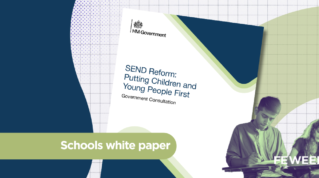It’s no wonder last month’s Ofsted reform proposals put an emphasis on inclusion. Governors simply MUST check how leaders are translating values and intent into action, especially with transgender awareness and policies.
Exclusionary politics are emboldening direct discrimination against transgender people in particular.
Right now the world is a frightening place for transgender and gender divergent people, with global leaders effectively seeking to erase transgender rights and also intersex people – due to insistence on a biologically binary approach to sex, and gender.
These are the T and the I in the LGBTQIA+ acronym.
Statistically, research shows that intersex, transgender and otherwise non-binary people account for approximately 4 per cent of the UK population, with scientific evidence showing they are biologically different, and historical evidence showing they have existed all around the globe forever.
That’s one in 25 of all people.
Furthermore, 23 per cent of the Gen Z population in the UK are using a they/them pronoun to one degree or another, according to one study.
This is clearly of significant importance in the FE sector, especially now with the radical political shifts in the US, coupled with the rise of the populist right here in the UK. There is a very real and significant threat to transgender and otherwise gender divergent students, and staff, that FE institutions must be prepared for.
What can be done?
Education is key. It is absolutely vital that when conflicts and tensions arise, teaching staff must be properly informed and have the confidence to intervene.
If there is any ambiguity on their part around policy and facts it could result in escalations and added complication, not to mention the additional distress a delay to step in would cause – both to transgender learners and to those of opposing belief systems.
We must remember that the sector has a responsibility to protect all learners from harm, not just those we agree with, regardless of their beliefs.
Sex, gender and belief are all protected characteristics.
If teachers are unsure of the facts, then ambiguity can be a barrier to effectively and calmly diffusing conflict.
For example, if a cisgender learner complains that a transgender learner is using ‘the wrong’ bathroom, what is the college’s policy around this? How is this to be handled?
What happens when a learner misgenders another, and when challenged cites free speech? Or religious beliefs?
With all the current tensions – for example at the University of Sussex, which has just been charged a record £585,000 fine for not upholding freedom of speech – governors must ensure that leaders are asking, and answering, all of these questions. And they must ensure that ALL staff are adequately trained to manage these situations.
Given the lack of understanding around this topic, with only binary biology taught in early years education and many totally unaware of the prevalence and types of intersex, the whole arena is on shaky foundations. It really is a case of going ‘back to basics’.
It’s necessary to ensure that all staff revisit ‘what they think they know’ in order to have the levels of confidence required in this topic, and to adequately support learners.
When I speak to staff prior to my training, it seems many are confused and even conflicted, often wanting to be inclusive yet simply not knowing how to be.
Effective training can remedy this and it’s great to see staff empowered by facts.
Additional SEND focus
Ofsted said in their proposals that they will “in all cases include a new focus on inclusion”. Inspectors will “look at how well providers support vulnerable and disadvantaged children and learners, including those with SEND”.
The specific reference to SEND is welcome, and there is an overlap between gender diversity and neurodiversity, with transgender people being three to six times more likely to be autistic.
This makes gender diversity especially important for colleges with SEND provision to understand.
Understanding and supporting learners appropriately is vital, which in turn means supporting staff to do so. Because the fine line between free speech and hate speech, and facts and misinformation, is getting harder to navigate.
If you would like to follow up with Che, visit www.viewfromadove.co.uk
















Hopefully, the response to the draft guidance for schools and colleges about children questioning their gender will still be released this year and the current Government will actively take some actions to give institutions the necessary direction. That guidance already answers both example questions posed in this article, and a standard approach will be much better than this “what would you do in this instance”.
Link to guidance press-release: https://www.gov.uk/government/news/parent-first-approach-at-the-core-of-new-guidance-on-gender-questioning-children
In addition, I wish more care were given in this discussion. The study that is linked to back up the claim that 4% of the UK population are intersex, transgender or otherwise non-binary people, actually contradicts that claim. This American study from 2000 not only contradicts it in the abstract, but the paper also states that the person to whom this statistic is attributed to denies ever making such a claim; and later evaluates it as unwarranted. The ipsos information linked in the same paragraph also doesn’t support the statement. This is an important discussion that deserves careful consideration, honesty and accuracy, and inconsistencies like this only damage the discourse.